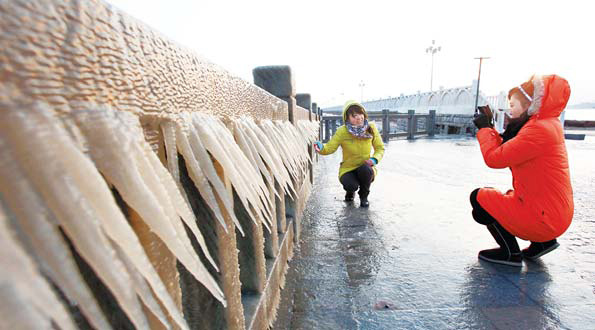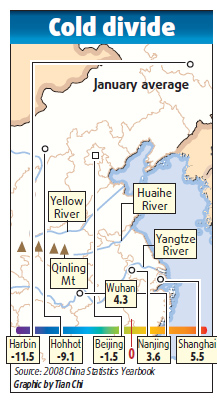Society
Residents struggle as cold weather heads south
By He Na (China Daily)
Updated: 2010-02-09 07:03
 |
Large Medium Small |
This is not the first time in recent years South China has been hit by a severe cold snap. Snow may not often fall south of the Yangtze River, but the winter weather still impacts on residents' lives and many are calling for cities to install new central heating systems.
"The division for central heating was just temporary, so this so-called boundary should be abolished to keep pace with China's development and the overall improvement in living standards. Residents deserve to enjoy a comfortable life," said Wang as he prepared for his journey home. "Officials should send staff with technology to investigate the real temperatures and people's needs, while local authorities should work out a way of solving the demand for heating."
The shortfall in central heating has proved a boon for manufacturers of air conditioners. More than 23 million units were sold last year, with sales expected to top 25 million in 2010, according to figures from the State Information Center.
"We installed air conditioners in both bedrooms and our living room," said Wang Aiping, 56, of Nanjing, capital of Jiangsu province. "My husband and I work and are not at home during the day, but we fitted them because my 82-year-old father lives with us."
|
 |
|
Two women take pictures of the rarely seen ice in Lianyungang, a port city in Jiangsu province. The temperature dropped to - 9 C on Jan 5. [Photo/Wang Jianmin] |
Her family pays on average about 230 yuan ($33) a month in electricity bills, but that can rise to as much as 700 yuan when they run the air conditioner for five or six hours a day.
"Room temperature can go below zero but my father still tries to save money by only turning on the heating about 10 minutes before my husband and I return from work. He'd prefer to just wear more clothes than use the electricity but I'm worried about his health," said Wang.
Many elderly people have taken to spending their days wandering heated shopping malls to stay warm, she said. "I've seen lots of older people with chilblains on their hands."
The plight of those suffering during winter months has not escaped the attention of deputies to China's many local people's congresses.
As well as air conditioners, those who can afford the extra expense are turning to electric heaters and blankets to stay warm. Poorer families rely on coal or wood-burning stoves, although the fumes they produce can cause carbon monoxide poisoning in unventilated rooms.
"Setting up a central heating system would not only increase the quality of life but it is also good for rational energy consumption and pollution control," said Wu, who urged the government to make the project a No 1 priority. "The government needs to enhance the study and use of clean energy, such as nuclear, solar and geothermal power, to reduce the dependence on electricity and decrease emissions of carbon dioxide and sulfur dioxide."
Officials in Nanjing have already unveiled plans for a massive central heating project next year. The system will involve surplus heat generated by the city's thermoelectric power plants being pumped to surrounding residential areas, according to new regulations.
"Enterprises inside the covered areas will be forced to use the central heating, while facilities like hotels and hospitals, and common residents communities, will be encouraged to use it," said Mei Peimin, director of the Nanjing Economic Commission's department of resources and comprehensive utilization. "Most power stations have already drawn a layout of how they can use their surplus heat and we hope the system will be adopted by developers of new constructions in the future."
But many challenges still lie ahead if the city wants to spread its central heating coverage, said Mei.
One problem is that local authorities would prefer to generate heat through thermoelectric power stations because coal causes energy wastage and pollution. But establishing new plants in areas that do not have them would be expensive, with each 600,000-kilowatt station costing roughly 2.9 billion yuan.
Finding the right location for new plants would also be difficult. Residents could object to stations being build close to their homes, and if they are too far out the cost of transferring the heat will soar.
As almost no buildings in the south have central heating, setting up a system would mean a massive investment, said Mei.

Authorities in Wuhan, capital of Hubei province, and Hangzhou, capital of Zhejiang, are also planning heating networks, according to China-heating.com, a website for information on heating products.
Nanjing has experimented with central heating before. In 2005, the Sunshine Yaju residential community began to take heat from the nearby No 2 Thermoelectric Power Station and charged households 7 yuan per sq m. However, only a sixth of households agreed to pay for the service, which was eventually scrapped.
"We looked at building a centrally heated community but the cost was just too high. The concept still needs time to develop," said the owner of a real estate firm in Nanjing who declined to give his name.
For some people living below the imaginary line between Qinling Mountain and Huaihe River, the cold has just become a way of life.
"I've lived in Shanghai for 20 years, so I am already used to the winter weather," said retired doctor Li Changfen, 63. "As long as you do not stay in one place for too long and wear enough clothes, the cold is not that bad. If you really feel it is too cold, just turn on the air conditioner. The cold season is not long, I don't think we need central heating."
The issues of central heating is the problem left over by history, said experts, who warned that establishing systems in more southern cities is no easy task and would not be realized overnight.
"The whole idea still needs more work. Officials must realize that walls of buildings in the south are generally thinner than in the north, and windows are single glazed. It means buildings struggle to store heat," said Professor Xu Guangjian. "Any construction would be a big project. If developers transfer the costs to the consumers, will they be able to afford it and would they want to pay for it?"














